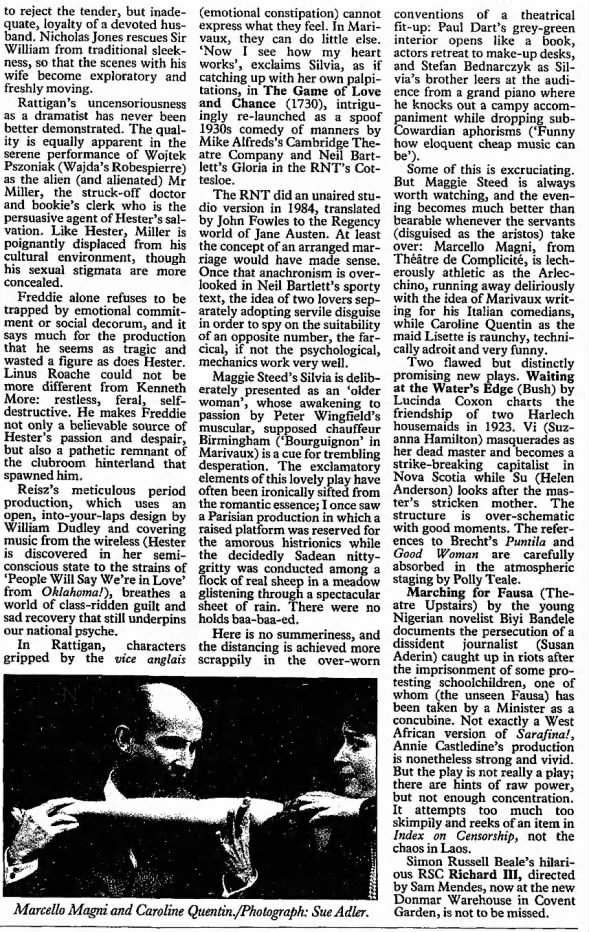We have a split jury on this one. Janie really didn’t get on with it at all, whereas I found it an interesting, albeit flawed piece.
Janie and I saw the third preview, so it is possible the production will change a little before press night…but I doubt if it will change much.
Here is a link to the Royal Court resource on this play/production.

The Alun Armstrong character is a deputy headmaster, a teacher of 45 years standing, who is due to retire. Maggie Steed is his wife and Nicola Walker is their estranged daughter.
I don’t think it is a spoiler to explain that the central aspect of the controversy in which the central character is embroiled is his use of the cane, until corporal punishment was prohibited in the mid 1980s…
…or is it? The play’s title is The Cane, so it must simply be about that topic. Certainly the cane is a central artifact to the plot…
…yet much of the story doesn’t really add up. Would modern school children really riot against a teacher, days before his retirement, simply because he used to administer the cane 30+ years ago? Surely there must be more to it than that?
Similarly, much of the family’s back story doesn’t exactly add up or reconcile between their memories either. Axe marks on the wall are a visible example throughout the piece.
Janie saw these conundrums (or do I mean conundra?) as signs of weakness in the plot, but I thought the cane was a metaphor for the use of violence as a disciplinary measure generally. I thought the play was a metaphor for power struggles and violence within institutions like schools, within families, between teachers and pupils, between husbands, wives and children.
Still, it was hard to sympathize with any of the characters. In particular, the Maggie Steed character seemed at once pathetically weak and yet hell-bent on making forceful, irreversible decisions in an attempt to assert some element of power. I think Maggie Steed’s voice was failing on our night, which hopefully is a passing issue, but her floundering gestures didn’t really work for either of us. Perhaps she can control and channel those a bit more convincingly between preview and press night.
Janie didn’t find Alun Armstrong’s character sinister enough either, whereas I thought his manner of suppressed violence disguised by a kindly veneer was sufficiently creepy or sinister for me. Vincent Price without the ham.
Similarly, for me, the Nicola Walker character was sinister. We couldn’t get to the bottom of her motivation, even by the end of the play, but I think that air of mystery was the writer’s intention. At first you wondered how this person could be the daughter of those parents – by the end I thought I could see the echoes – a different style of controlling behaviour and a different style of violence – but still those characteristics to the fore.
Personally, I liked the debate about education within the play. In the absence of physical discipline through corporal punishment, how do teachers maintain control. (Answer, in my view, mostly by teaching well.)
There was a fascinating speech from Nicola Walker’s character about discipline the modern way in academy schools – a form of, “eyes front at all times, no talking in the corridors between lessons”. I could imagine that being effective as discipline…but I’m not sure I’d have been any more comfortable in that sort of disciplinary environment than I was/would have been in the old-fashioned “threat of corporal punishment” environment.
Whether that debate would seem as interesting or insightful to those mixed up in the education system (either as parents, teachers or pupils) today I have no idea, but it seemed relevant and interesting to me, sitting (as I do) on the outside of education for several decades.
Before the play we got chatting with a woman in the drinks queue who turned out to be Gaynor Churchward…Minnie Driver’s mum. It would have been interesting to have learnt after the show what she thought about the play; her life experience of schooling being rather unusual and very different from either of ours. But we didn’t stick around to chat with anyone – we dashed off for a shawarma supper and a reasonably early night.
I agree with Janie to some extent that the piece might benefit from a little more naturalism and direct tackling of the issues/story, but I still found the production a worthwhile and enjoyable evening in the theatre, in the hands of some expert theatrical operators.
Once the production has been through press night and formally reviewed, you should find the reviews here. Janie and I will then find out which of us is “right”. 😉



